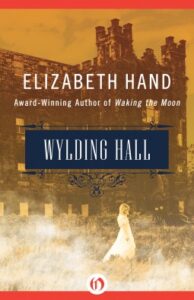 Wylding Hall, Elizabeth Hand
Wylding Hall, Elizabeth Hand
Wylding Hall uses Fairport Convention’s real history as a starting point: the tragedy (a suicide in this book, two deaths in a car crash in real life), the music and style, and the time spent at an old house in the countryside (Wylding Hall in the book; Farley Chamberlayne for Fairport Convention)… and then Hand takes it off into imagination. It’s not really about Fairport Convention, just using them as a jumping-off point, but if you’re into their music you can’t help but think of them while you read. (Though this time I was thinking about Siobhan Owen’s version of “Scarborough Fair”, as well. There’s something wistful and otherworldly about her voice that makes a good accompaniment to this book.)
The format is of interviews with the remaining members of the band and some other people who got involved in the story — as if it’s a documentary, long after the fact. Slowly, each character contributes what they saw, heard and felt, building up a picture of something eerie and chilling, but indeterminate. Hand is very careful not to reveal the horror until near the end.
I think the Neolithic barrow with Julian’s watch in it and the final photo of the girl are probably actually a bridge too far — it takes the book from being haunting and eerie, lightly touched by something ancient and unknowable, and gives it a moment of horror that doesn’t quite sit with it. It doesn’t spoil the book, but it’s a slightly discordant note. Then again, without that finality, it’d feel like the story just tails off. So maybe that’s the best ending, after all.
The book was a reread for me; not something I’d have predicted myself rereading, but the book does have something special, that restless strangeness at its heart that doesn’t have a satisfying answer. It came back to me all of a sudden when someone was talking about a different book written in interview format, and I suddenly had to read it again!
